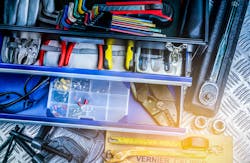If someone visited your maintenance shop for the first time, would he or she be impressed with your professionalism, or does your shop’s appearance say “amateur hour?”
Some shop attributes contribute not only to a professional appearance in the shop, but also to more professional performance in the field:
- Clutter-free. Clutter is distracting, unhygienic, productivity-reducing, and sometimes unsafe. It does not exist in a professional shop.
- Clean. Desks, tables, and workbenches are free of coffee stains, food containers, grease, and the like.
- Proper decorum. The shop walls are conservatively adorned. Any posters are maintenance-related, such as conversion charts or other useful information.
- Organized charging stations. Battery-powered tools and test equipment are part of the maintenance arsenal today. The professional shop has a central charging station or two, with discreet and designated spots for specific chargers and integrated cord management.
- Modern lubricants area. Different types of lubricants are clearly labeled and separated from each other. Grease guns and other lubricant tools or containers are color-coded to lubricant types.
About the Author

Mark Lamendola
Mark is an expert in maintenance management, having racked up an impressive track record during his time working in the field. He also has extensive knowledge of, and practical expertise with, the National Electrical Code (NEC). Through his consulting business, he provides articles and training materials on electrical topics, specializing in making difficult subjects easy to understand and focusing on the practical aspects of electrical work.
Prior to starting his own business, Mark served as the Technical Editor on EC&M for six years, worked three years in nuclear maintenance, six years as a contract project engineer/project manager, three years as a systems engineer, and three years in plant maintenance management.
Mark earned an AAS degree from Rock Valley College, a BSEET from Columbia Pacific University, and an MBA from Lake Erie College. He’s also completed several related certifications over the years and even was formerly licensed as a Master Electrician. He is a Senior Member of the IEEE and past Chairman of the Kansas City Chapters of both the IEEE and the IEEE Computer Society. Mark also served as the program director for, a board member of, and webmaster of, the Midwest Chapter of the 7x24 Exchange. He has also held memberships with the following organizations: NETA, NFPA, International Association of Webmasters, and Institute of Certified Professional Managers.
